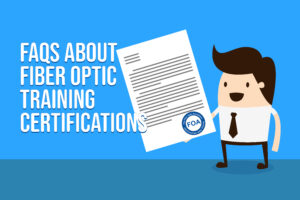If you are a Certified Fiber Optic Technician (CFOT), that means you’ve passed the FOA certification to perform and service fiber optics applications. Once you are certified, that means you now have the know-how in fiber optics that you can use in any job concerned with fiber optic cables. This includes designing, installation, and operating – be it inside a plant, on any premise such as in manufacturing or commercial industries.
The Fiber Optic Association in Cebu gives you CFOT certification founded on the science of fiber optics technology as well as dedicated skills in handling fiber optic technology. Most CFOTs are connected to the industry as contractors or installation experts.
As copper cables are becoming obsolete and the demand for fiber optic technology rises, so does the demand for accredited fiber optic technicians. While a number of fiber optic technicians learn their skills on the job, it is still an advantage to have that competitive edge by pursuing certification, thus making you more credible. A certification course gives you a grasp of the basic skills you must have to become a well-versed fiber optic technician. Please read on to know what you need to be a CFOT.
Please read on to know what you need to be a CFOT:
Get an FOA Certification
The FOA stands for the Fiber Optic Association, an international group. The FOA bears the torch when it comes to providing practitioners the best skills in fiber optics handling. There are a couple of ways to be certified with the FOA. The first one is to get some training at an FOA approved institution. These institutions give you fiber optics courses that are backed by FOA standards where you will be mentored by experienced fiber optic technicians. After finishing this course, you are now competent of the skills and knowledge required by the FOA; thus, you are given a fiber optic technician certification.
The second way to get a certification is to finish a “Work to Cert” program. This program is intended for fiber optic technicians who are already working in the industry but are not yet certified. Once they prove that they meet the FOA standards, they are granted certification
Pursue Any of These FOA Certifications
The FOA also gives you options for Industry-Based Certifications (IBC). These are exam-based, and offers accreditations by third parties, and are often developed by private institutions. The FOA, on the other-hand, has two basic fiber optic technician certifications. The FOA also offers the following specialist certifications:
The Certified Fiber Optic Technician (CFOT) certification is given to those who have the basic knowledge of fiber optics and can be used in general applications.
The Certified Premises Cabling Technician (CPCT) certification is given to individuals who already have an expertise in the installation of fiber optic cable in buildings and in campuses. This certification mostly applies to those working in enterprise networks (LANs), such as in security and management systems.
The Certified Fiber Optic Specialist (CFOS) certifications are founded on two categories: those based on skills and those on applications. CFOT focuses on installation and testing of fiber optic cables; while CPCT is more focused on specific processes behind fiber optic applications.



